Finding the right Google SERP API is essential to extract accurate real-time search results. With billions of searches taking place on Google every day, a reliable SERP API makes it possible to build applications for SEO analysis, lead generation, and price monitoring.
However, with so many options out there, it can be tough to choose one. To help you decide, we will objectively compare the seven best APIs for Google SERP scraping based on price, speed, features, and reliability to help you scrape huge amounts of data from Google faster and more efficiently. Keep reading to learn more!
TL;DR: Quick Overview
ScraperAPI offers the most comprehensive tooling to scrape Google SERP, including a structured data endpoint to pull JSON data from any query at the most affordable price.
| Key Benefit | Free Credits/Plan | |
| ScraperAPI | Best Google SERP API to collect structured JSON data with a simple API call | 5,000 free API credits |
| SerpAPI | Extensive selection of search engine endpoints | 100 monthly searches free |
| DataForSEO | Tailored for digital marketing and building in-house SEO tools | Limited free tier |
| OxyLabs | Specialized proxy management system | 7-day free trial (5,000 results) |
| SerpStack | Great option for small projects | 100 free requests per month |
| Zenserp | Second fastest response times | 50 free requests per month |
| Apify | Marketplace of pre-built “Actors” for various data extraction needs | $5 monthly credit (around 1,400 free results) |
The Best Google SERP API of 2025: ScraperAPI
ScraperAPI is the leading provider of enterprise-scale SERP scraping. It combines affordability, reliability, and speed with a web scraping solution built to collect web data at scale with minimal effort.
Setup takes just a few minutes, enabling you to retrieve Google SERP pages using custom locations, devices, languages, and more without worrying about blocks or CAPTCHAs.
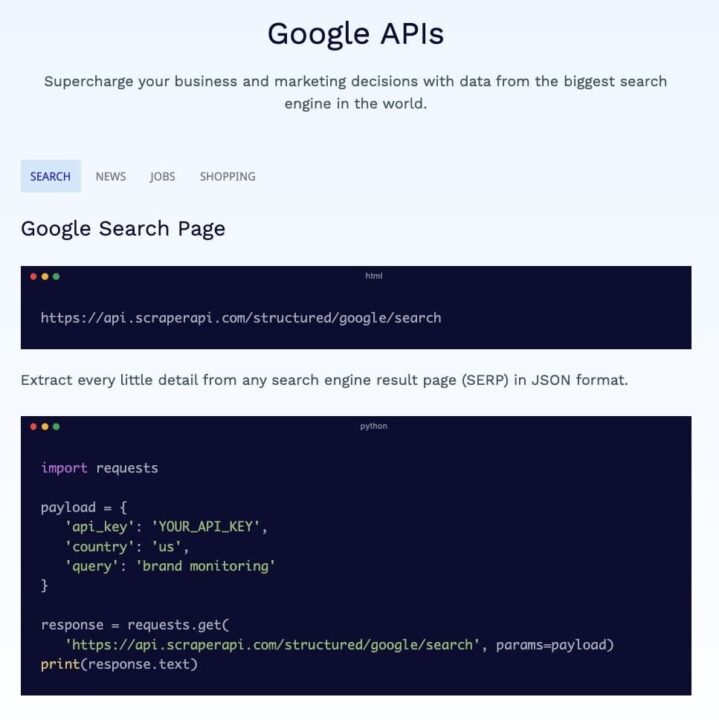
Key Features
Unlike other tools in this list, ScraperAPI offers a wide range of benefits for engineers and data teams:
- Vast Proxy Pool: Over 40+ million IP addresses (data center, residential, and mobile) across 50+ countries.
- Smart IP Rotation & CAPTCHA Handling: Achieve a 99.9% success rate using machine learning and statistical analysis to bypass anti-scraping measures.
- JavaScript Rendering: You can render dynamic webpages without manually managing headless browsers using the Render Instruction Set from ScraperAPI.
- Structured Data Endpoints: Get clean and organized JSON output from Google or other popular services, including Amazon and Walmart.
- Multiple Google Endpoints:
Note: All these endpoints are available on every ScraperAPI plan, including the free plan, with no extra fees.
With a simple API call, its Google SERP API lets you turn any Google search result into structured JSON data.
Turning this:
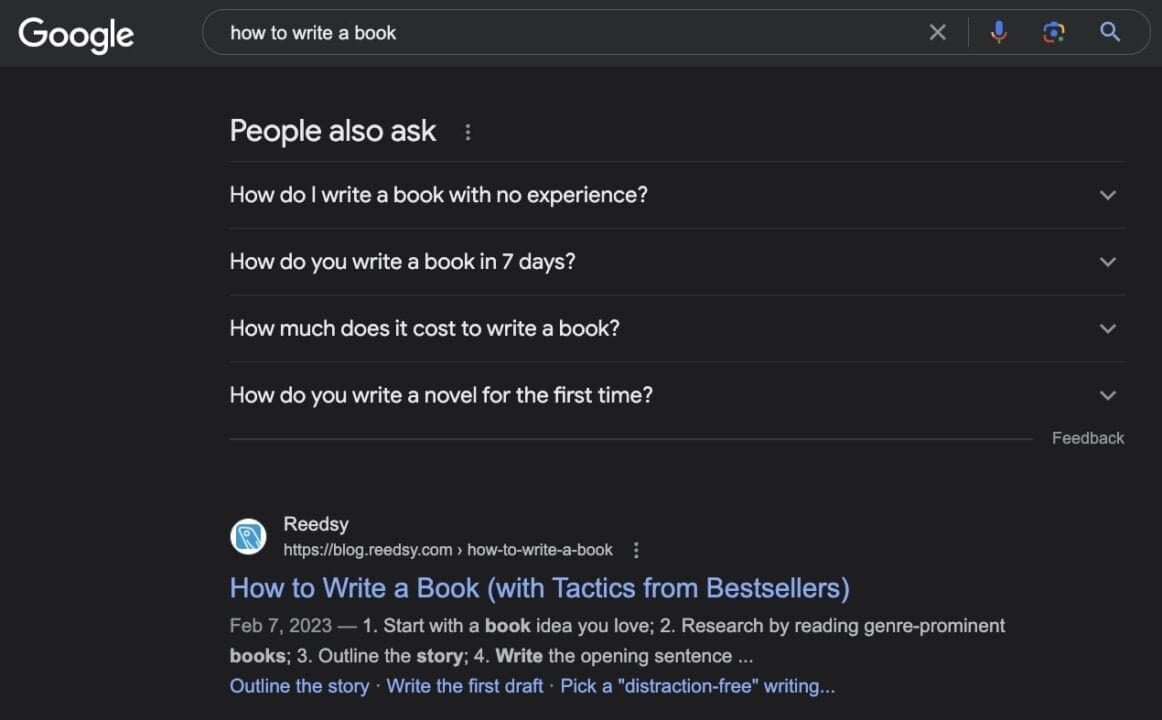
Into this:
"related_questions": [
{
"question": "How do I write a book with no experience?How do I write a book with no experience?",
"position": 1
},
{
"question": "How much does it cost to wrote a book?How much does it cost to wrote a book?",
"position": 2
},
{
"question": "How do you write a book in 7 days?How do you write a book in 7 days?",
"position": 3
},
{
"question": "How do you write a book from scratch?How do you write a book from scratch?",
"position": 4
}
]
By sending your request through ScraperAPI’s Google SERP endpoint, it’ll:
- Use machine learning and years of statistical analysis to bypass any anti-scraping mechanism thrown your way
- Parse the response and organize every relevant data point into a JSON structure
- Allows you to collect localized data using geotargeting
- Save you hundreds of development and maintenance hours
Additionally, you could use the standard API to retrieve the raw HTML. You have full control over what data you get and how you get it.
Pricing
ScraperAPI’s monthly pricing starts at $49, providing 4,000 searches plus 5,000 free credits to test the service. Larger plans scale up to handle millions of requests, ensuring you only pay for the volume you need.
Also, with ScraperAPI, there are no hidden fees or surprise charges for features like geotargeting or JavaScript rendering.
Enterprise-Grade Tools for Scale
For teams managing large projects, ScraperAPI offers advanced features:
For teams looking to streamline data workflows, ScraperAPI integrates with DataPipeline, a low-code scheduler that helps you:
- Set Recurring Schedules: Use CRON or custom intervals for ongoing SERP data collection.
- Customize Data Delivery: Have results automatically sent via Webhooks or download them as JSON or CSV.
- Bulk Scrape: Monitor Up to 10,000 Queries per project with just a few clicks.
If you’re dealing with millions of requests or need faster turnarounds, ScraperAPI’s Async Scraper offers:
- Simultaneous Requests: Send bulk queries in one go while running up to 100 concurrent threads.
- Automatic Timeouts & Retries: Let ScraperAPI handle any rate limits or blocks.
- Webhook Integration: Receive data directly in your app, folder, or email.
What Customers Are Saying
ScraperAPI’s excellence is reflected in glowing customer reviews:
“Honestly, I love ScraperAPI. It makes my world easy. I have been wanting to build a search engine for years but was discouraged when my traditional crawlers were blocked. I saw Scraper and the whole story changed.”
Pros:
- Most affordable and scalable option on the list
- Provides easy-to-handle JSON data with just a search query
- Robust web scraping tool kit
- Generous free plan, offering 5,000 API credits
- Additional structured data endpoints for Google Shopping, Google Jobs, and Google News
- Multi-threads and geotargeted are included with every plan
Cons:
- Doesn’t provide additional endpoints for other search engines
Note: Learn how to use ScraperAPI’s structured data endpoints with our simple-to-follow tutorial, or get started for free with 5,000 API credits.
6 Other Great Google SERP APIs
2. SerpAPI (Major Selection of Endpoints)
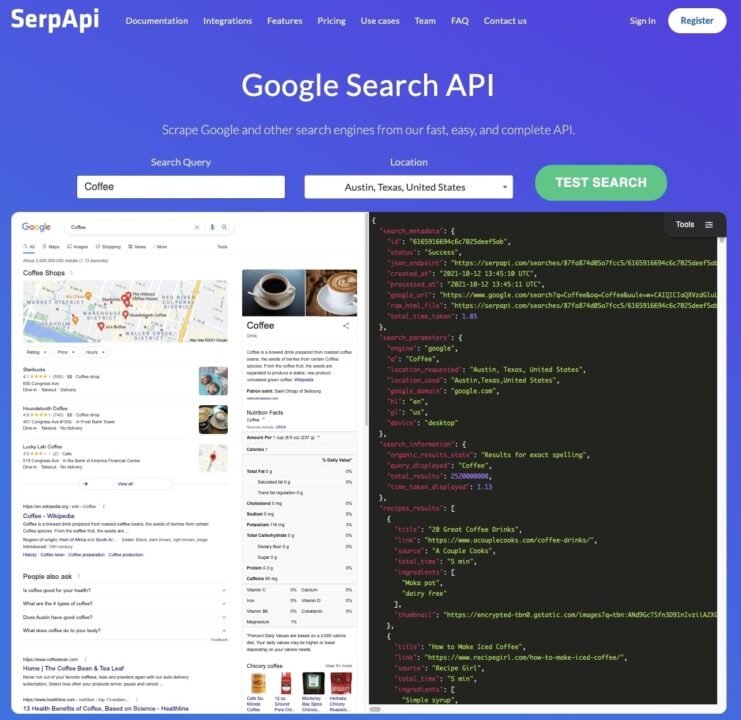
As its name implies, SerpAPI is a web scraping tool designed specifically to collect data from search engines. It comes loaded with the widest variety of Google-related APIs and has a near 100% success rate. In a quick test, their API responded in about 2.5 seconds, which is impressively fast for fetching SERP data.
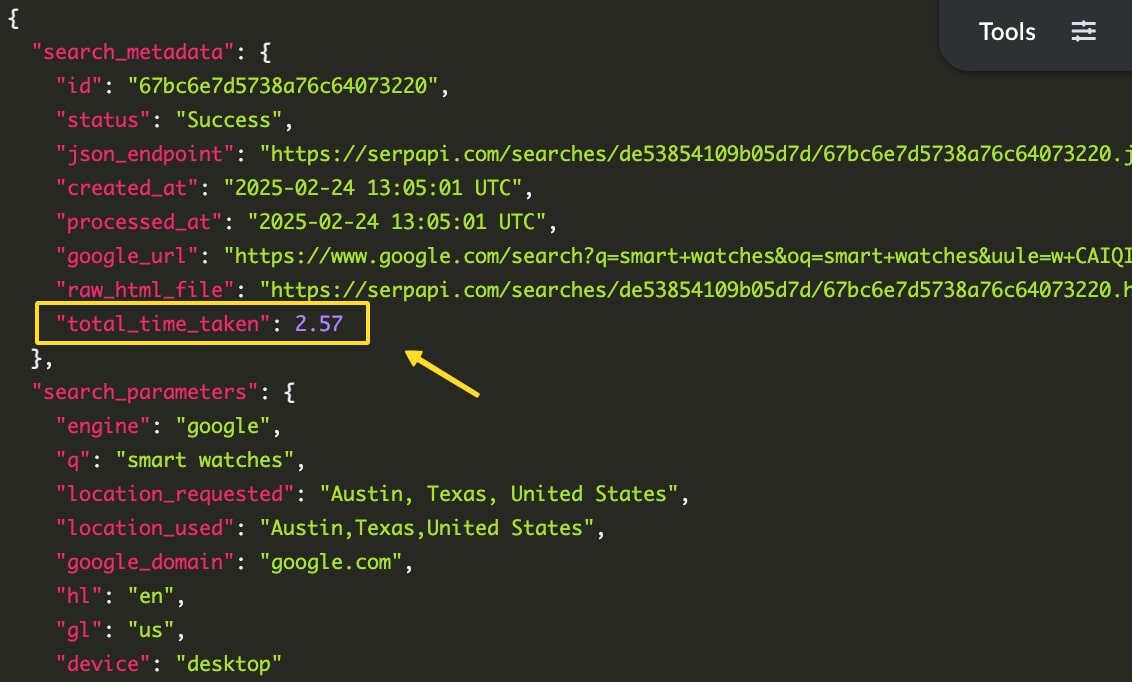
When it comes to variety, SerpAPI has the longest list of structured data endpoints, including:
- Google Search API
- Google Maps API
- Google Jobs API
- Bing Search API
- YouTube API
- eBay API
SerpAPI also offers dedicated API endpoints for Yandex, Baidu, and Bing, allowing users to collect precise search engine data based on their specific needs. They also offer a generous free plan, which gets you 100 monthly searches.
Pricing for SerpAPI begins at $75 per month for 5,000 Google searches, and the following tiers quickly ramp up in price, making scaling to large amounts of data quite costly. For context, ScraperAPI’s $49/month beginners plan would provide you with 4,000 searches, while you can expect roughly 3,500 Google searches at SERP API’s $50 mark.
The disparity becomes even more evident at higher tiers – on SerpAPI’s second tier, you get 15,000 Google searches for $150 per month. By comparison, ScraperAPI provides 40,000 searches at $149 per month, making ScraperAPI nearly three times more cost-effective.
However, one notable extra is SerpAPI’s “Legal Shield,” which covers potential legal issues within the United States. Note that the “Legal Shield” is available only on their later two, more expensive plans.
Pros:
- Biggest selection of endpoints to collect data from search engines
- Simple to use and implement
- Comprehensive API documentation
Cons:
- Too expensive for large projects
- Delivers results in only JSON format
3. DataForSEO (Designed for Marketing Teams)
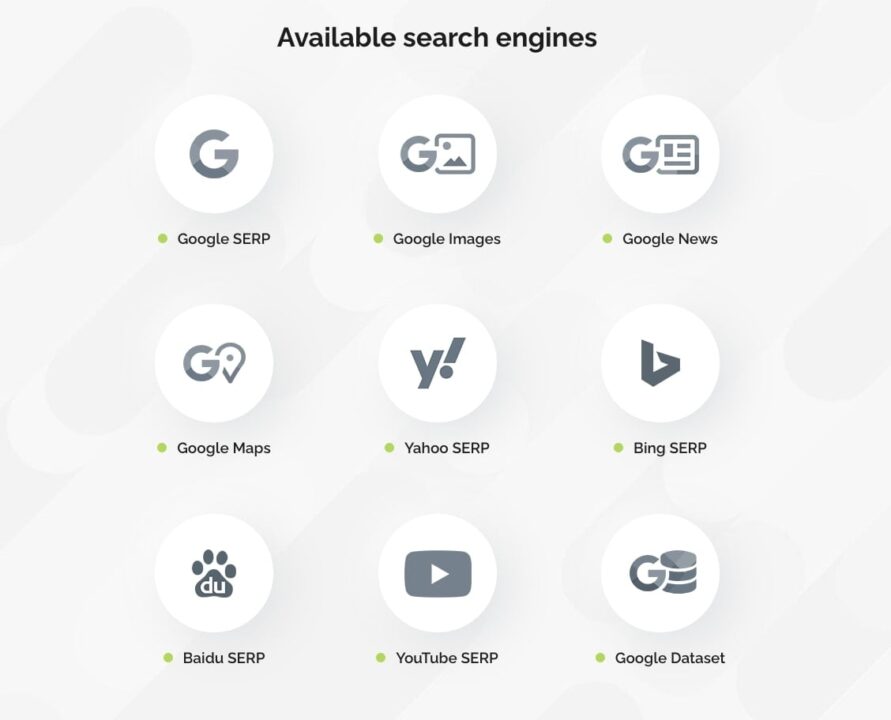
DataForSEO is a search engine API specifically designed for digital marketers who want to build their in-house SEO tools instead of relying on tools like SEMRush, Ahrefs, and MOZ for their SEO data.
They have built custom APIs for different data problems a digital marketer might want to solve:
- Search Engine API
- Google Ads API
- Google Trends API
- Traffic Analytics API
- On-Page API
- Google Shopping API
Unlike the previous solutions, DataForSEO uses a Pay-As-You-Go payment system, which is great for those who aren’t 100% sure how many API requests they need to make each month. Though there is a minimum payment of $50, so once you start using it, you will have to spend $50.
The biggest downside is that response speed is locked between different price tags. So, for more affordable prices, you would have longer wait times – not to mention that the guaranteed response time is 45 minutes after the post() request is made.
Additionally, DataForSEO’s high-speed pack charges $0.002 per search, translating to 25,000 pages for $50 – which becomes costly at scale, especially for businesses scraping large volumes of SERP data.
Pros:
- Designed specifically with marketing teams in mind
- Free trial available ($1 free usage).
- Great collection of search engine endpoints
Cons:
- Expensive if scraping at scale
- Complex documentation
- Instead of a consistent response speed, higher speeds are locked behind a higher price
- Long response times overall
4. OxyLabs (Alternative Proxy Manager)
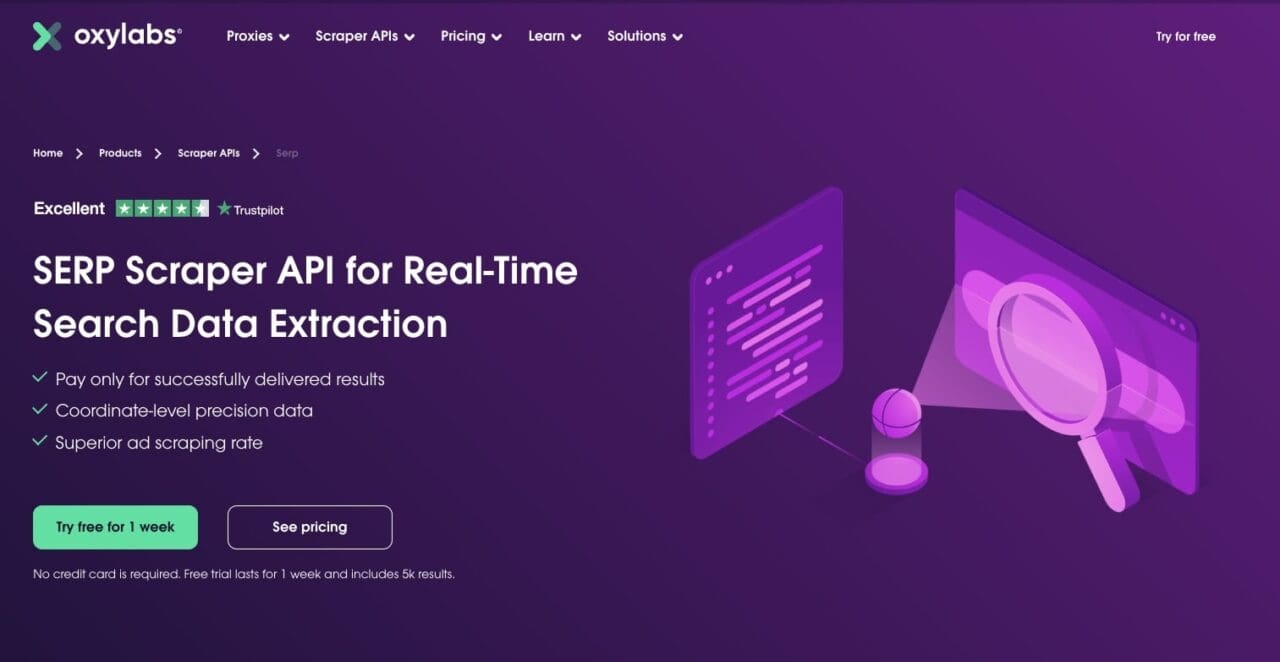
OxyLabs’ SERP API offers a 100% success rate and an easy-to-use API, which is great for anyone who needs to be guaranteed fast, high-quality search engine data from Google, Bing, Baidu, and Yandex.
Much like ScraperAPI, OxyLabs supports geotargeted searches from 195 countries, handles CAPTCHAs, and retrieves data in either JSON or CSV, with the option to deliver it via API or directly to cloud storage (AWS S3 or GCS).
The only drawback is its high cost. The base plan starts at $49 per month (or $2 per 1,000 results), which means we receive 24,500 results, but it gets pricy at subsequent plans.
Notably, OxyLabs does provide a 7-day free trial capped at 5,000 results, limited to one user. However, there’s no clear definition of what counts as a result. For example, most tools discuss the number of Google search links you get. This little detail can be misleading for newcomers.
Pros:
- 100% success rate
- High-quality proxies
- It gets closer to ScraperAPI’s price after reaching 1M results
- Integrated AI assistant
Cons:
- May not be ideal for smaller customers or projects
- Vague pricing model
5. Serpstack (Great Option for Small Projects)
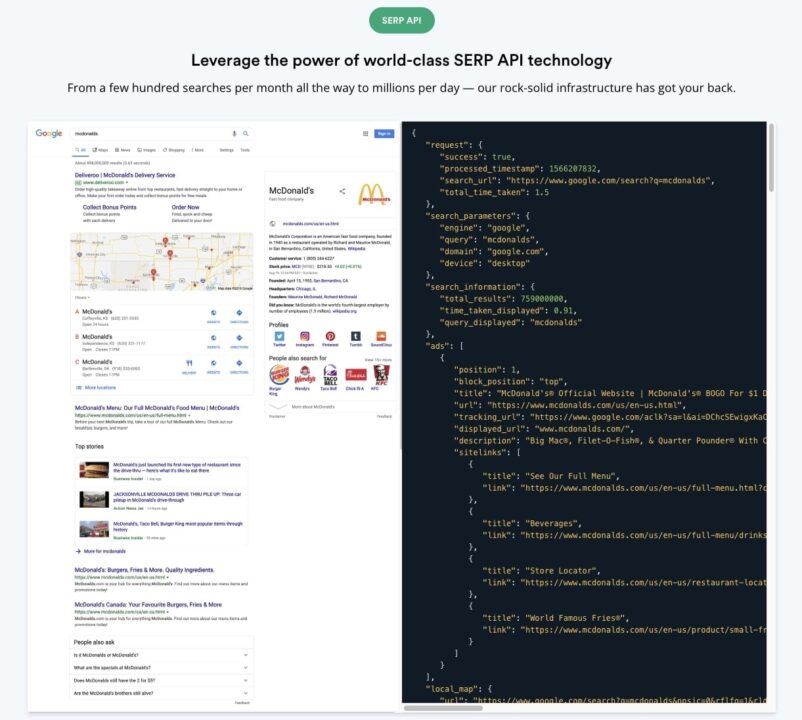
SerpStack is a solid search engine API option for users focused on retrieving high-quality data without queue limitations. Its robust cloud infrastructure can handle high-volume requests, ensuring reliability under heavy workloads.
The team at SerpStack has built a fully-featured API that can extract:
- Google Search Results
- Google Images
- Google Videos
- Google News
- Google Shopping
And return the data to you in either JSON or CSV format. They have extensive documentation, making it easy to use and integrate with your current data feeds.
Like other tools in the list, it has a free tier that allows up to 100 monthly requests, and after that, paid plans start at $29.99 per month. Pricing ranges from $29.99/month for 5,000 Google searches to $169.99/month for 50,000 searches, which can be more affordable compared to SerpAPI (charging $150/month for 15,000 searches).
Pros:
- Good functionality and great documentation.
- Solid Tech Support
Cons:
- Very expensive at scale
6. Zenserp (Second Fastest Response Time)
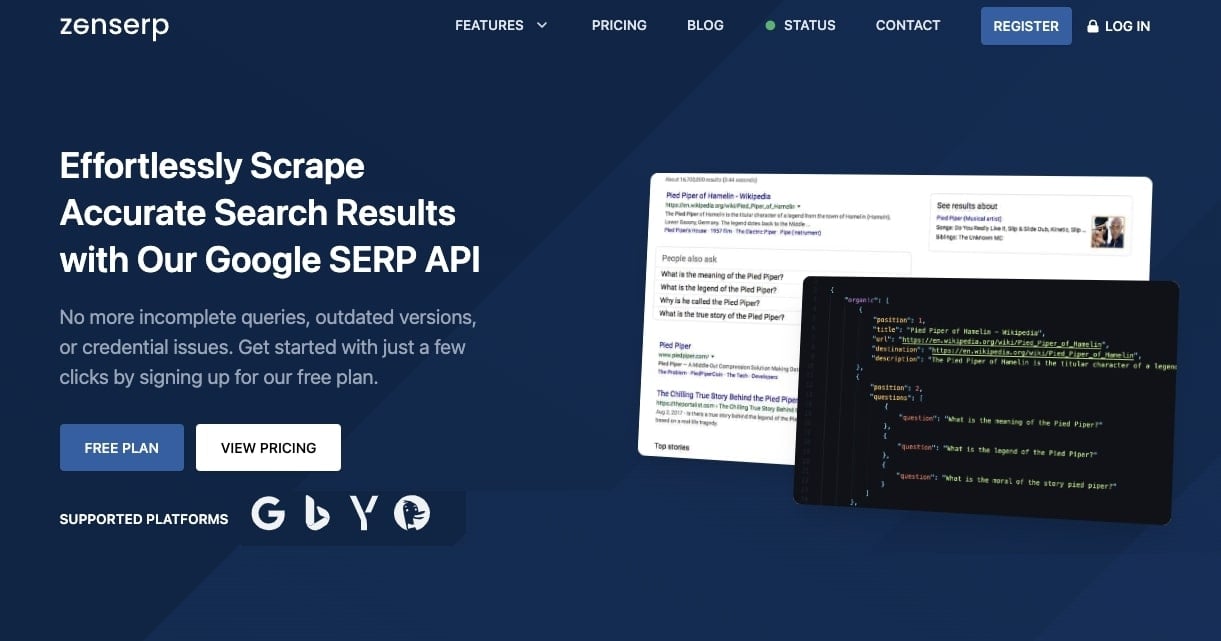
Zenserp is a strong option if speed is your top priority, delivering an average response time of around 4 seconds without compromising data quality. Additionally, the API itself boasts a full range of features that allows you to scrape all types of SERP data, including organic, paid, answer box, featured snippet, top story, local maps, etc.
Their documentation is also excellent, making it easy to get up and running fast. Zenserp also provides 50 free API requests each month. Other handy features include a request builder, which generates production-ready code snippets, and a “playground” feature, which lets you test searches at no extra cost.
Pricing starts at $49.99 per month for 5,000 searches. However, Zenserp gets quite expensive as you scale, reaching $499 per month for 120,000 Google searches, which is a whopping $200/month more than what ScraperAPI charges for the same volume of data!
Pros:
- High-speed API with a lot of functionality.
- Desktop and mobile SERP results
Cons:
- Too expensive for large projects.
- It is not as feature-rich as other options.
- Can target most countries but not city-level
7. Apify (Store of Pre-Made Scrapers)
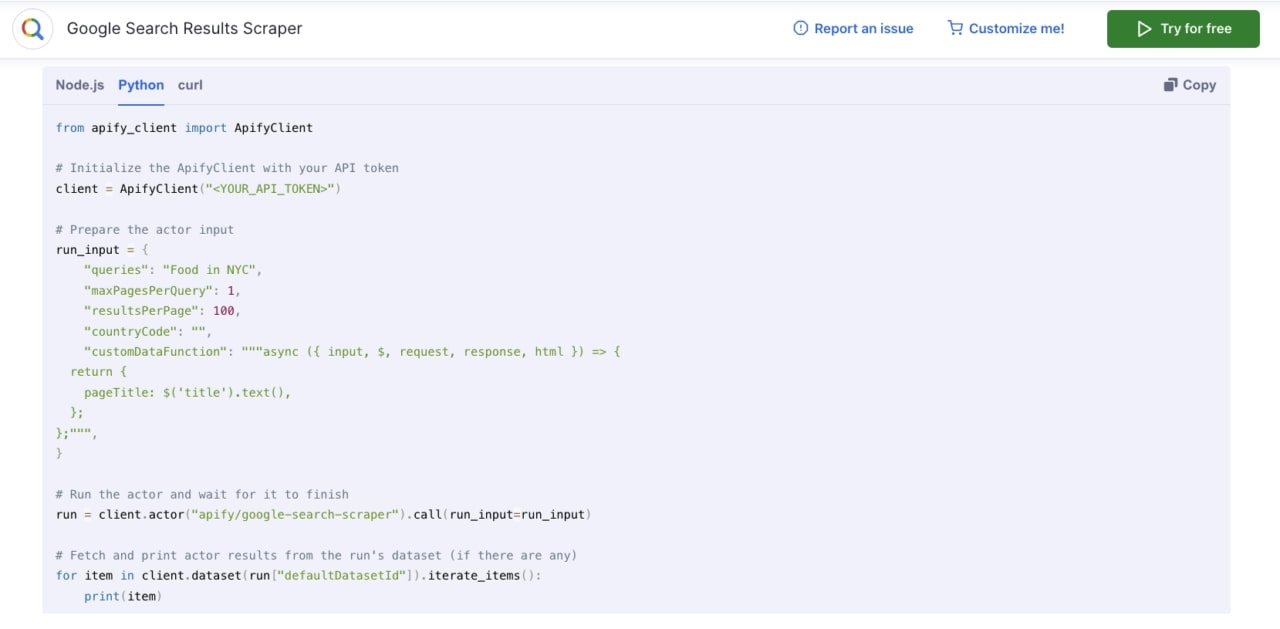
Apify is a great marketplace/store where you can buy pre-made scrapers. It has many different solutions, including a full-flesh Google Search scraper.
Their pricing is more complex than the straight API options listed above as they price their services in terms of “Actors” and “requests,” but in general, they are good value for money compared to some of the other more expensive options.
The average response time was around 7 seconds. They also offer a free plan that provides $5 in monthly usage credits, covering up to 1,400 Google results at no cost.
If you scrape data regularly, the $49/month Starter plan can fetch over 14,000 monthly Google results, though these are counted in batches of 100 results per page, effectively amounting to 140 requests for $49.
Beyond scraping, Apify offers an actor library of pre-made automation tasks and cloud storage for collected data. Exports are available in multiple formats, including JSON, Excel, CSV, XML, and RSS, making integrating or analyzing your scraped information easier.
Pros:
- Wide range of pre-built scrapers to suit lots of scraping needs
- Scalable cloud infrastructure
Cons:
- Pricing is confusing
- Their Search scraper doesn’t have the same level of functionality as some of the other options.
- Expensive at scale
Comparison: Which Google SERP API Is Right for You?
With numerous SERP APIs available on the market, we’ve assessed them based on the criteria we believe matter most to you as a customer:
- Price – Cost-effectiveness, free trials, and guarantees to test services risk-free
- Performance – Response times and success rates for reliable data acquisition
- Special Features – Advanced capabilities that differentiate each service
- Ease of Use – How developer-friendly the implementation process is
- Speed – How quickly you can retrieve your desired search results
Considering these criteria, here is a comparison table of the best SERP APIs for real-time data.
| Quick Comparison | Monthly Pricing (Lowest Plan) | Searches | Speed (avg) | Success Rate | Key Feature |
| ScraperAPI | $49 | 40,000 | Fast (2–3s) | 99.99% | Integrations, proxies, scheduling, JS rendering. |
| SerpAPI | $75 | 5000 | Fast (2.5s) | 100% | Legal US Shield |
| DataForSEO | Pay-as-you-go | Up to 25,000 (High-Speed pack) | Moderate (6s) | 98% | Marketing focus |
| OxyLabs | $49 | *24,500 results | Fast(3.5s) | 100% | Premium proxies |
| SerpStack | $29.99 | 5,000 | Moderate (5-7s) | 98% | Lower Entry price |
| Zenserp | $49.99 | 5,000 | fast (3s) | 97% | Quick response time |
| Apify | $49 | *14,000 results | Moderate (7s) | 95% | Ready-made scrapers |
Key Notes
- OxyLabs & Apify*: Some tools measure “results” instead of searches. For example, one search could yield 10+ results (links), which inflates numbers and confuse newcomers.
DataForSEO: Requires a $50 minimum deposit. Including a high-speed pack demands a minimum commitment of $2,000/month, making it costly for most users.
- ScraperAPI: Includes Google Shopping, News, Jobs, and Maps endpoints in all plans—no extra fees.
Why ScraperAPI Wins
- Affordability: ScraperAPI offers 4,000 searches for $50, making it one of the most cost-effective solutions on the market.
- Speed & Reliability: Enjoy a quick 2–3 second response time with a 99.99% success rate. You can also monitor up to 10,000 queries per project with just a few clicks.
- Ease of Use: ScraperAPI is super easy to integrate with your codebase. It supports a wide range of programming languages and is backed by extensive documentation, making it simple for developers at any level.
Pricing Comparison: How Many Searches Can You Get for $50?
When comparing the cost-effectiveness of Google SERP APIs, it’s crucial to understand exactly what you’re getting for your money. The graph below shows how many searches you can perform with a $50 investment across different providers:
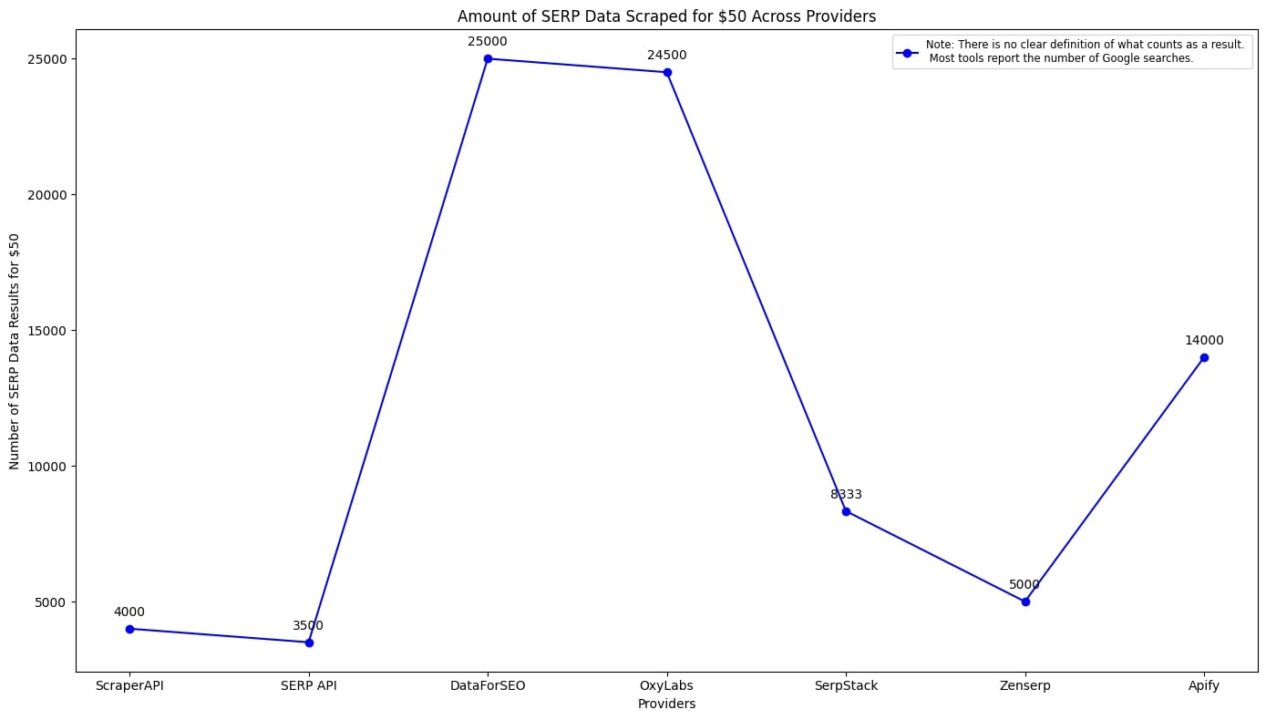
Important considerations:
- These are monthly rates; annual discounts are excluded from this comparison.
- Some tools measure “results” instead of searches. For example, one search could yield 10+ results (links), which inflates numbers and misleads newcomers.
- If we apply this “results” metric to ScraperAPI, each search produces approximately 10 search results, meaning their 4,000 searches would yield around 40,000 results – still making it the most cost-effective option.
- ScraperAPI consistently provides the best value per dollar spent, even when comparing different measurement standards.
Why Do You Need an API to Scrape Google?
While you could build your scraper to extract Google search results, maintaining it over time is a technical nightmare. You can be blocked if you continuously attempt to scrape from the same IP address. Ironically, Google discourages crawling its own search engine results pages, even though Google’s entire search empire was built by crawler bots indexing the web.
Moreover, Since Google’s 2017 search update, manual data collection has become nearly impossible. You’d have to:
- Sign out of any Gmail accounts and Chrome profiles
- Delete cookies and clear history
- Change your GEO location via proxy or VPN to your target country. In both cases, if you’re using a browser extension, Google will most likely detect you are using data center IPs.
- Open a new tab or browser window for every search.
You would need to constantly update your self-built scraper to bypass these roadblocks, which is both time-consuming and inefficient.
For production purposes, using an API is a much better option. Here’s why:
- Cost-Effective: These APIs are far more affordable than Google’s official API, letting you gather large volumes of search results without overspending.
- Anonymity: By rotating IP addresses on each request, your real IP remains hidden, minimizing blocks and other restrictions from Google.
- Geo-restricted content: You can access location-specific search results from anywhere in the world without detection.
- Parsed Data Options: Whether you need parsed JSON, CSV data for easy integration, or raw HTML data for flexibility, most SERP APIs cater to your specific data output needs.
- 24/7 Support: Instead of spending hours troubleshooting alone, you can rely on round-the-clock assistance to resolve technical issues quickly.
- Production grade reliability: Engineered for high-volume scraping, these APIs require minimal maintenance and are designed to handle Google’s anti-scraping systems at scale.
Wrapping Up
Every one of the solutions listed in this article has proven to provide a near 100% success rate, a wide range of reliable search engine endpoints, and a suited infrastructure for scalability.
However, price, ease of use, and transparency are critical variables to consider when collecting data from millions of search results.
At first glance, many SERP APIs may appear similar, yet hands-on testing often reveals that only a handful (specifically two or three) provide truly stable, production-grade performance.
Among these, ScraperAPI stands out for its ease of use, speed, and powerful anti-scraping bypass mechanisms, making it the ideal choice for reliable, scalable, and cost-effective data extraction.
Additionally, ScraperAPI supports Google Maps, Shopping, News, and Jobs from a single subscription, a feature unmatched by many competitors. Try ScraperAPI for free and start collecting Google data in minutes.
Google Scraping FAQs
A Google SERP API is a service that fetches Google search results and converts them into structured data (typically JSON), making it easier to integrate and analyze search data within your application.
While Google does offer various APIs for free, each comes with strict usage limits. For instance, the Custom Search API allows 100 free queries per day; exceeding this requires $5 per 1,000 requests, capped at 10,000 daily queries. While this might be enough for small projects, it quickly becomes expensive and impractical for larger data extraction needs.
Yes, scraping Google search results is entirely legal, as this falls into the realm of publicly available data. However, to avoid getting blocked by Google’s anti-scraping mechanisms, you’ll need to use a web scraping solution like ScraperAPI.
SEO (Search Engine Optimization) is the process of optimizing a website or online content to improve its visibility and ranking on search engine results pages (SERPs) for specific keywords and phrases. A SERP (Search Engine Results Page) is what search engines like Google, Bing, or Yahoo display when users enter a search query featuring organic results, paid ads, and other search elements. In simple terms, SEO is the strategy used to rank higher, while SERP is the outcome of that strategy.

